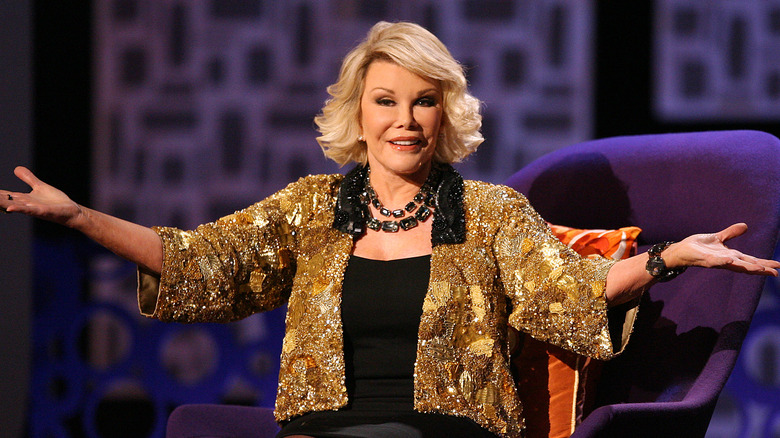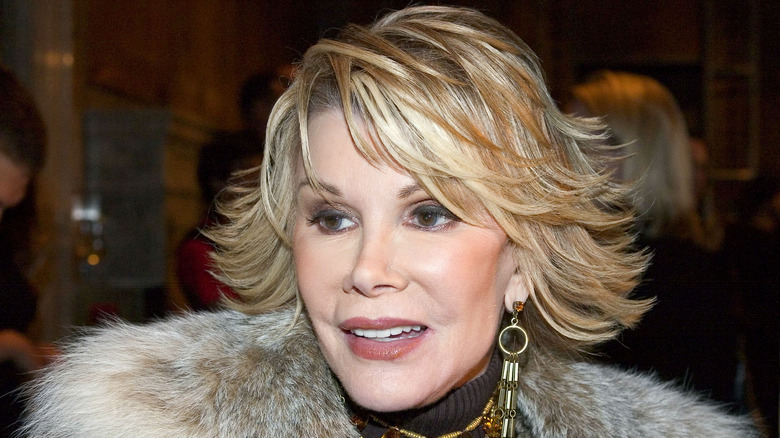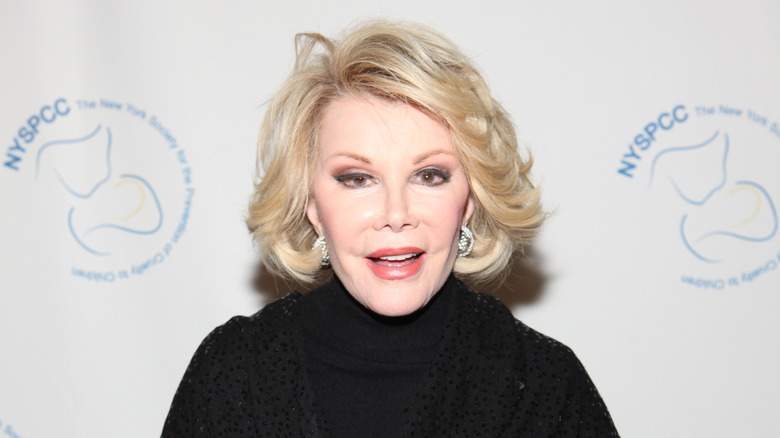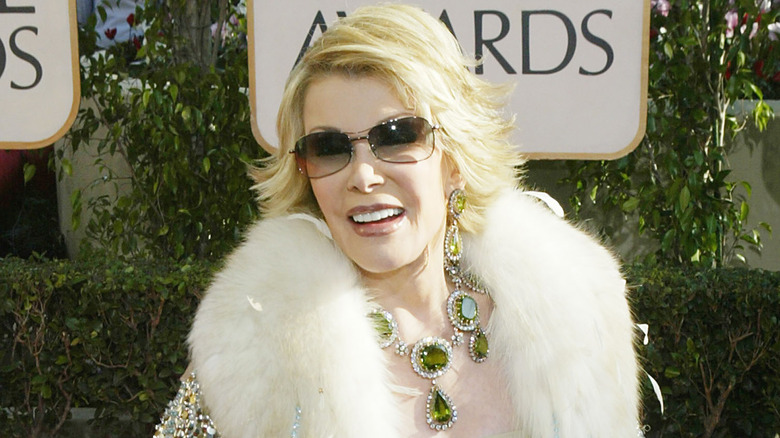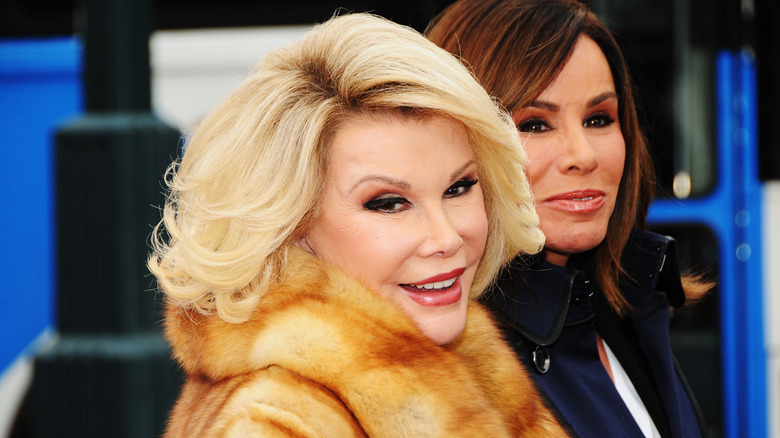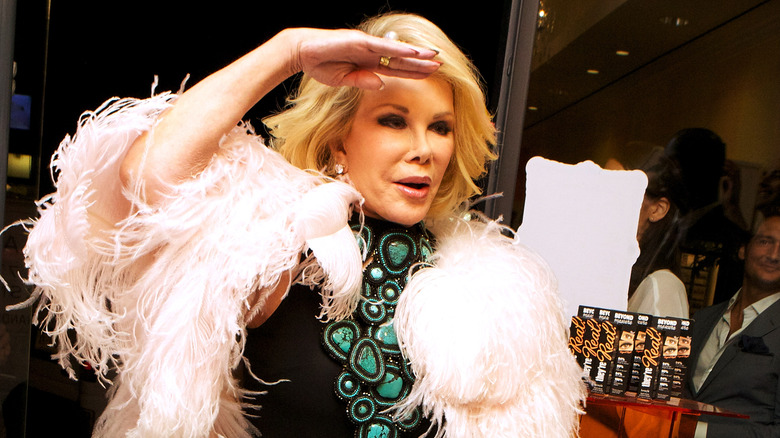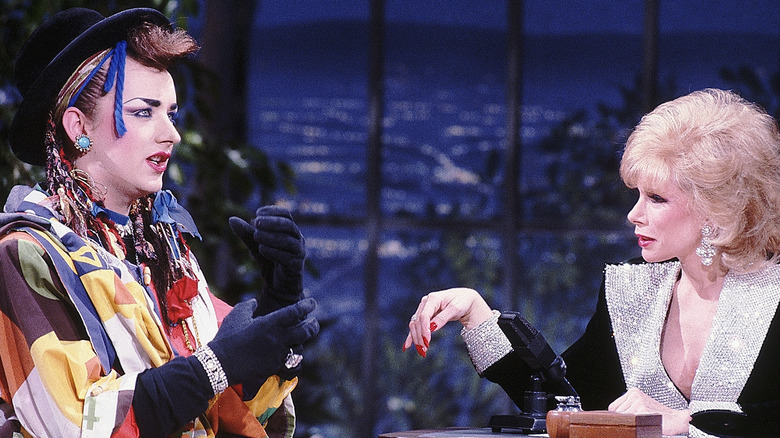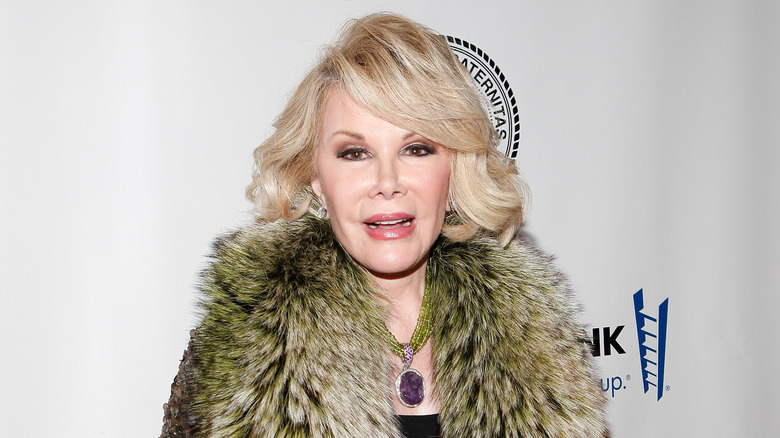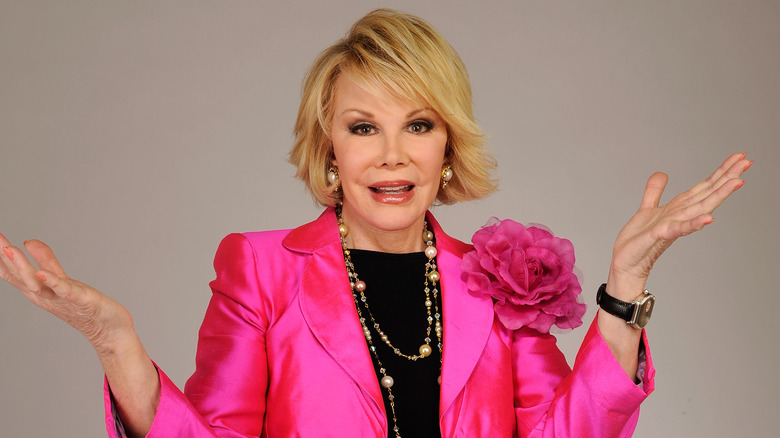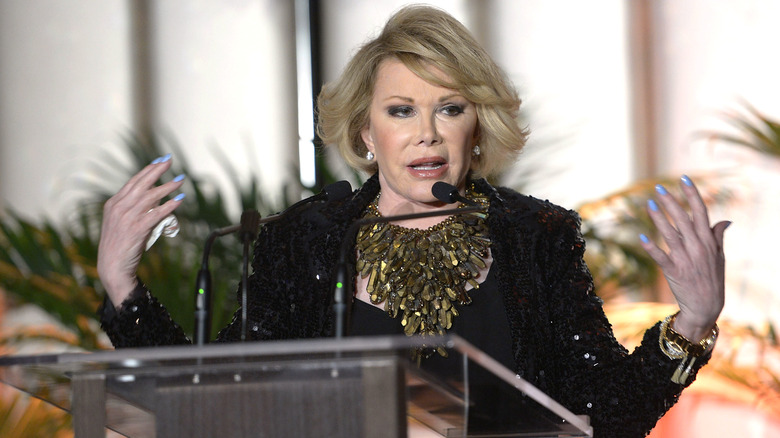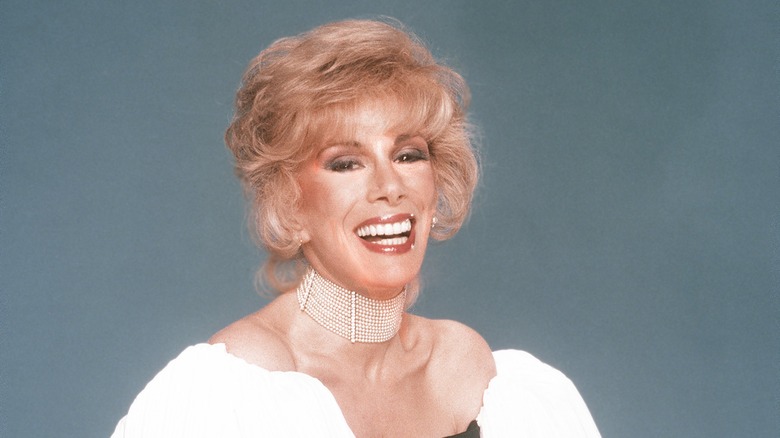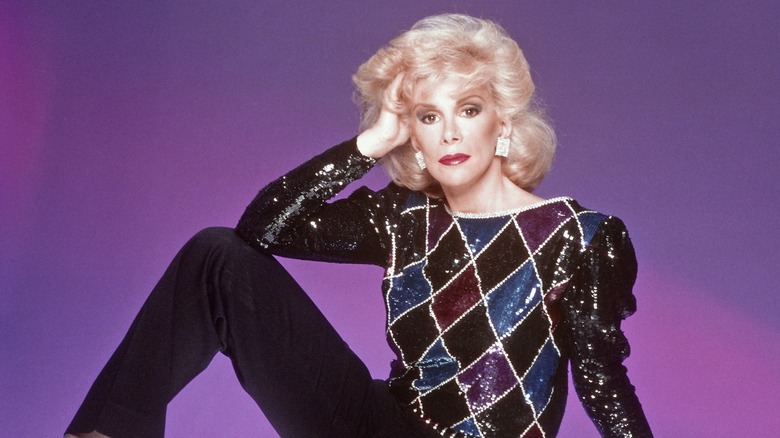Things We Learned About Joan Rivers After She Died
In September 2014, television host and one of the best stand-up comedians of all time, Joan Rivers, died at the age of 81. Not only did her death catch the world off guard, but the aftermath also resulted in a medical malpractice suit being filed by her family against New York's Yorkville Endoscopy clinic. The matter was confidentially settled in 2016 as doctors accepted culpability for Rivers' death, as per CNN.
In the years after her death, a number of key details about Rivers' life have been revealed by the likes of her daughter, Melissa Rivers, and biographers. From the legendary performer fighting over a Tickle Me Elmo doll to where her daunting collection of curated jokes actually landed up, there are a lot of unknown stories and bits of trivia about Rivers that have only now been discovered. All of these recollections and walks down memory lane only help to paint a more complete picture of an American pop culture icon, who changed the landscape of comedy for women and zigzagged into a successful decades-long career on television.
Joining the list of famous celebrities who died in their 80s, Rivers lived a full and unforgettable life, taking every opportunity to crack a rib-tickling joke or retell a humorous anecdote that grew a few legs along the way. So, let's take a look back at the most interesting information we have learned about Rivers since she died in 2014.
Joan Rivers was happy about how she looked toward the end
Joan Rivers never hid the fact that she was a big fan of plastic surgery and changing her appearance. In a 2009 interview with Pioneer Press, she said: "I love my Botox. I don't know what I'd look like without it. It gives you a smooth face. I think I look great for my age." She added how plastic surgery wasn't about trying to look a certain age or even younger but about feeling "good" about yourself.
While there were murmurs and rumors about how many procedures Rivers had done in her life (and she kept everyone guessing about it), her daughter revealed the actual number in the memoir "The Book of Joan: Tales of Mirth, Mischief, and Manipulation." Melissa Rivers disclosed that her mother had "365 plastic surgeries," since she believed that "life is hard; you might as well do what you need to do to make yourself feel better."
Melissa stated that although her mother had undergone a number of procedures to alter her looks, she reached a point toward the end of her life in which she was finally pleased with her appearance. Melissa wrote: "On her eightieth birthday, she said to me, 'You know what? For eighty, I don't look so bad.' Better late than never."
She had five favorite items in her home
For over two decades, Joan Rivers lived in a luxurious triplex in New York. After her death, her daughter opened up to The Wall Street Journal about five of her mother's favorite items in the home. Melissa Rivers explained how Joan had a specific footstool in her library that she would choose to sit on while chatting on the phone or having meetings, and the reason was to help keep a straight posture. In addition, Joan cherished a cabinet housing various items from Fabergé that she'd started to collect in the 1980s.
Elsewhere in the home, Joan held a special affinity for the painting "Mille Baisers" by Kees van Dongen. Melissa revealed it was one of the last pieces of art that her mother and father, Edgar Rosenberg, bought before he died in 1987. Joan didn't only buy items for herself, as Melissa explained. In fact, Joan purchased a glass chandelier, modeled in the shape of Christopher Columbus' ship, for Melissa's apartment situated on one floor of the triplex, and another for her Los Angeles home.
One of Joan's most prized possessions, though, had a fascinating story behind it. "The wrought-iron cradle planter was originally a sand ashtray that the Plaza Hotel planned to toss out during a renovation in the '70s," Melissa explained. "My parents' pleas to buy it were rejected, so they sneaked one into their hotel room, emptied the sand in the tub, ran the water and took it apart to carry out."
She once fought over a Tickle Me Elmo doll
Anyone who has watched the 1996 Arnold Schwarzenegger comedy film "Jingle All the Way" knows all about the lengths that people go to in order to secure the hottest toy of the holiday season. Joan Rivers experienced her own Turbo Man-styled incident, but it involved a Tickle Me Elmo toy, as Melissa Rivers revealed in "The Book of Joan: Tales of Mirth, Mischief, and Manipulation."
According to Melissa's account of the story, Joan was on an episode of the "Today" show that featured the most coveted and hard-to-find toys in the country at the time, including the Tickle Me Elmo doll. As luck would have it, the Tickle Me Elmo in the studio was the only one available in the New York vicinity at the time, and Joan eyed it as the perfect gift for her grandson, Cooper. However, she had to compete with host Matt Lauer, who wanted the toy for his child, too.
Melissa wrote: "According to a very unreliable witness (my mother), a pleasant interview quickly turned into a minor tussle and then into a UFC event." She added that as Joan and Lauer wrestled for possession of the doll on the floor, Joan feigned an injury to her hip. Worried that she was not okay, Lauer attempted to help her up, but Joan snatched the toy and off she went with it. It's amazing what the biggest Christmas toy crazes in history have caused people to do.
Joan Rivers had an interesting use for Milk Duds boxes
Most people have a sweet tooth to some degree, and Joan Rivers was no exception. Her candy of choice? Milk Duds, according to Melissa Rivers. In "The Book of Joan: Tales of Mirth, Mischief, and Manipulation," Melissa wrote that her mother used to enjoy snacking on the candy so much that it became a part of her diet.
Joan didn't dispose of the Milk Duds boxes; instead, she kept them for a different — and frankly, smart — reason. "I recently found out that, when traveling, my mother used to hide cash in empty Milk Duds boxes — they're the same size as paper money — so in case someone rifled through her purse, they'd overlook it," Melissa wrote about her mother's genius.
As Melissa told People, she knew that Joan liked to hide money around the house in peculiar places, so when her mother died, she searched through the various sections and items to see what Joan had squirreled away. Unfortunately, she found out about the Milk Duds practice much later on, after she had been throwing boxes out for a while.
A biographer claimed she had bulimia
While Joan Rivers' obsession with plastic surgery was well documented, an episode of Vice's "Dark Side of Comedy" suggested that Rivers' concern about her appearance led to her developing an eating disorder in her later years. According to author and journalist Leslie Bennetts, who wrote the book "Last Girl Before Freeway: The Life, Loves, Losses, and Liberation of Joan Rivers," Rivers used to eat mints in an attempt to suppress her appetite. Bennetts claimed: "Joan was always incredibly paranoid about her weight, and she was bulimic for a lot of her adult life."
For her book (via Radar), Bennetts spoke to friends and figures who had been in Rivers' life, and they alleged the star had an eating disorder — with some calling it anorexia and others referring to bulimia. According to Bennetts' research, Rivers dealt with issues concerning her weight since childhood, but they intensified after her husband, Edgar Rosenberg, died by suicide in 1987.
If you or someone else you know needs help with an eating disorder, or is struggling or in crisis, contact the relevant resources below:.
- Visit the National Eating Disorders Association website or contact NEDA's Live Helpline at 1-800-931-2237. You can also receive 24/7 Crisis Support via text (send NEDA to 741-741).
- Call or text 988 or chat 988lifeline.org.
Joan Rivers was great to work with
Fans hear horror stories about respected Hollywood stars who are actually terrible people. Fortunately, the pleasant and vibrant persona that Joan Rivers presented on screen was similar to the actual person she was when the cameras turned off and the lights went out, according to those who worked with her.
After Rivers died, writer and comedian Julie Klausner wrote an article about her on Vulture. Klausner explained how she loved working with Rivers on a web series that was never released, as well as two reality shows. "Joan is — was, I guess, though I can't yet refer to her in the past tense — not just funny, but fun," Klausner wrote. "You felt like you were at a party when she was around, and a good one, with classy people who had great stories and wonderful food. Just talking to her, you felt more alive, more glamorous, sharper."
"RuPaul's Drag Race" winner Bianca Del Rio ended up being one of Rivers' final guests on "In Bed With Joan." Speaking to TheWrap, Del Rio explained how the interview was only meant to be 15 minutes, but they shared laughs and enjoyed each other's company for 90 minutes. "And you know, she didn't have to be nice; she could have just barreled through the interview," Del Rio said. "But she didn't. She was generous, she was kind."
She left donations to several charities
Considering her long tenure in showbiz, many fans wondered who inherited Joan Rivers' money after she died, reportedly a $150 million fortune at the time of her death. In terms of the distribution of her wealth, she left money for her closest family members, loyal staff members, and even extra cash to enable her beloved dogs to be looked after when she was gone. In addition, Rivers ensured the causes close to her heart received financial compensation.
Melissa Rivers was named the executor of her mother's will. A part of Joan's last wishes included donations to various charities. While the amounts weren't disclosed, Joan gave money to the following six charities: The Cystic Fibrosis Foundation, the Jewish Home and Hospital Federation, the Jewish Guild for the Blind, Guide Dogs for the Blind, the Simon Wiesenthal Center, and God's Love We Deliver.
Joan Rivers' massive collection of jokes ended up at the National Comedy Center
The 2010 documentary "Joan Rivers: A Piece of Work" showcased a side of Joan Rivers that fans might not have been too familiar with: her meticulousness. The film revealed that Rivers possessed a carefully curated collection of her jokes stored and available for easy access in a cabinet. Not only did this contain some of her best zingers of all time, but it was also typed and organized into categories.
Considering her pedigree in comedy, it should come as no surprise that there were suitors lining up for the cabinet of chuckles after she died in 2014. Speaking to The New York Times, Melissa Rivers said that the Smithsonian Institution approached her for the collection. However, when she found out that the museum wouldn't be displaying the cabinet all the time or making it accessible, she declined, knowing that her mother would have agreed with her decision.
Instead, Melissa Rivers donated the collection to New York's National Comedy Center. Journey Gunderson, the executive director for the center, raved about how organized the collection was in comparison to George Carlin's catalog, which was described as "mainly scraps of paper organized into Ziploc baggies then put into a folder by topic."
Barack Obama was a fan of hers
Many people laughed at Joan Rivers' razor-sharp brand of comedy, but she also rubbed people up the wrong way with provocative jokes or her "special" way with words. In 2014, a few months before her death, she made headlines for quipping (via The Hollywood Reporter) that then-President Barack Obama was a homosexual and his wife, Michelle, was transgender. It was far from Rivers' first brush with controversy, but her comments still raised eyebrows and there were a number of people who thought it was said in poor taste, especially in relation to the U.S. president and the first lady.
Despite this, Obama still reached out to Melissa Rivers after her mother's death to express his condolences and appreciation for all the laughs she brought. Speaking on "Fashion Police: Celebrating Joan" (via E! News), Melissa revealed how she received an outpouring of messages from people she would never have imagined, including Obama. She said: "I received a letter from the White House, President Obama, someone who was often a target of her jokes, as was Mrs. Obama, but I received a hand-written note saying 'Not only did she make us laugh, she made us think.'"
Joan Rivers was allegedly jealous of Elizabeth Taylor
While chatting to Vogue about her book "Last Girl Before Freeway: The Life, Loves, Losses, and Liberation of Joan Rivers," Leslie Bennetts explained that while feminists view Joan Rivers as a trailblazer and champion for women in entertainment, Rivers tore down a lot of her fellow females along the way. One of her chief targets was Hollywood icon Elizabeth Taylor, whom Rivers mocked for gaining weight once upon a time.
According to Bennetts, Rivers' issue with Taylor birthed out of the green-eyed monster: jealousy. The author claimed that Rivers never saw herself as beautiful and envied other women who were showered with praise for their looks, such as Taylor. "She always felt it was an incredibly unfair advantage some women had," Bennetts said. "The main person she felt jealous of was Elizabeth Taylor, who was so beautiful that she was a movie star before she was out of childhood."
As Bennetts pointed out, however, Rivers would go on to achieve her own success, arguably overshadowing Taylor by having a longer and more varied career in show business.
She liked to embellish
According to Melissa Rivers, the showmanship in her mother didn't have an off switch. As a result, Joan found the need to add extra bells and whistles to various tales to make them taller and for dramatic effect. As Melissa wrote in her piece for the Daily Mail: "Most of my mother's fibs were simply embellishments to make a story she was telling better or more interesting." Melissa recalled how her mother once told her about a tumultuous and dangerous flight she was on, but when Melissa spoke to Joan's assistant about it, she discovered none of the events happened. She confronted her mother about it, and Joan said: "If I'd told you it was a simple, easy flight would you have found it interesting?"
Speaking to Vogue, Leslie Bennetts discussed more about how Joan Rivers bent the truth and people fell for it. She explained how Rivers told everyone she was a part of the Phi Beta Kappa academic society, but when Bennetts tried to verify the claim, there was no record of it, even though everyone accepted it as a fact for all those years. "She was very proud of it, except that it didn't happen to be true," Bennetts said. "Which was sort of her attitude about everything. It was all about image building: Correcting what nature had failed to give you."
In the mood for more celeb stories? Check out the things we learned about comedians after they died.
